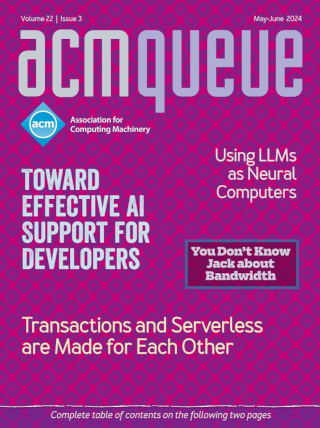
Design Exploration through Code-generating DSLs:
High-level DSLs for low-level programming
DSLs (domain-specific languages) make programs shorter and easier to write. They can be stand-alone - for example, LaTeX, Makefiles, and SQL - or they can be embedded in a host language. You might think that DSLs embedded in high-level languages would be abstract or mathematically oriented, far from the nitty-gritty of low-level programming. This is not the case. This article demonstrates how high-level EDSLs (embedded DSLs) really can ease low-level programming. There is no contradiction.
Forked Over:
Shortchanged by open source
How can one make reasonable packages based on open-source software when most open-source projects simply advise you to take the latest bits on GitHub or SourceForge? We could fork the code, as GitHub encourages us to do, and then make our own releases, but that puts the release-engineering work that we would expect from the project onto us.
Domain-specific Languages and Code Synthesis Using Haskell:
Looking at embedded DSLs
There are many ways to give instructions to a computer: an electrical engineer might write a MATLAB program; a database administrator might write an SQL script; a hardware engineer might write in Verilog; and an accountant might write a spreadsheet with embedded formulas. Aside from the difference in language used in each of these examples, there is an important difference in form and idiom. Each uses a language customized to the job at hand, and each builds computational requests in a form both familiar and productive for programmers (although accountants may not think of themselves as programmers). In short, each of these examples uses a DSL (domain-specific language).
The Curse of the Excluded Middle:
Mostly functional programming does not work.
There is a trend in the software industry to sell "mostly functional" programming as the silver bullet for solving problems developers face with concurrency, parallelism (manycore), and, of course, Big Data. Contemporary imperative languages could continue the ongoing trend, embrace closures, and try to limit mutation and other side effects. Unfortunately, just as "mostly secure" does not work, "mostly functional" does not work either. Instead, developers should seriously consider a completely fundamentalist option as well: embrace pure lazy functional programming with all effects explicitly surfaced in the type system using monads.





